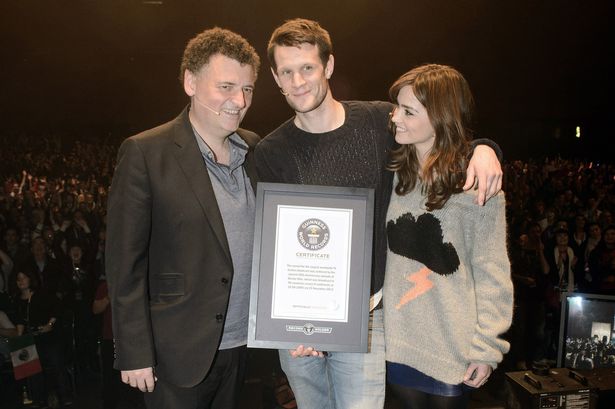The Cultural Lives of Doctor Who: The Hype of the Doctor
 I’ve recently written about the marketing of the Steven Moffat era, but here I’d like to look back at the promotional events of last month. ‘The Day of the Doctor’ stretched out into at least a week of the Doctor (if not longer) thanks to ‘An Adventure in Space and Time’, ‘The Night of the Doctor’, ‘The Science of Doctor Who’, ‘The Ultimate Guide’, ‘Doctor Who Live: The Afterparty’, ‘The Story of Trock’, ‘The Five(ish) Doctors Reboot’, The ExCeL Celebration, and more. Indeed, such was the level of Doctor Who’s UK cultural presence that it reached number three in the cinema box office, its “red button” BBC offerings out-rated many BBC1 and BBC2 TV shows, and broadsheet newspapers carried front-page images of a Royal reception hosted by Sophie, Countess of Wessex.
I’ve recently written about the marketing of the Steven Moffat era, but here I’d like to look back at the promotional events of last month. ‘The Day of the Doctor’ stretched out into at least a week of the Doctor (if not longer) thanks to ‘An Adventure in Space and Time’, ‘The Night of the Doctor’, ‘The Science of Doctor Who’, ‘The Ultimate Guide’, ‘Doctor Who Live: The Afterparty’, ‘The Story of Trock’, ‘The Five(ish) Doctors Reboot’, The ExCeL Celebration, and more. Indeed, such was the level of Doctor Who’s UK cultural presence that it reached number three in the cinema box office, its “red button” BBC offerings out-rated many BBC1 and BBC2 TV shows, and broadsheet newspapers carried front-page images of a Royal reception hosted by Sophie, Countess of Wessex.
Given this omni-coverage, and proliferation of texts that could easily be construed as paratexts (or vice versa), it’s hardly surprising that showrunner Steven Moffat has recently remarked in Doctor Who Magazine: “I dreaded this month, because… how do you pitch it at the right level. How do you make sure there’s enough Doctor Who without making people vomit with it all being too much? But it seems to be about bang on, I think”.
However, Doctor Who’s November ascension to the heights of hype brought with it a few unhappy voices: aggravated letter-writers and email-senders complained to the BBC’s Newswatch programme that BBC News coverage constituted advertising for a Corporation product rather than media/entertainment reportage, whilst The Radio Times’ letter section (14—20 Dec) included the following gem, from one Stephen Thompson: “Having enjoyed Doctor Who as young people in the 1960s and again as parents in the 70s, my wife and I decline to go along with the hype surrounding the 50th-anniversary ‘special’. Like the little boy who watched the king parading in his new clothes, we did watch it, but we found it incomprehensible… Labyrinth, also featuring John Hurt as a centuries-old survivor, though panned by the critics, was much better!”
The ‘hype of the Doctor’ becomes a thing in itself for these members of the public, inciting them to critique and reject excessive promotion from a public service broadcaster. The show’s production team were aware of this potential danger, however, with Moffat observing that there “has been more hype than I thought possible, and vastly more than I thought (in my weaker moments) wise.” For, as Jonathan Gray has noted, paratextual promotion’s mere existence can devalue a text. Hype indicates a text’s industrial and commercial roots all too obviously for some audiences.
Doctor Who is perhaps unlikely to be deemed ‘art’, but it can certainly be positioned as a public good linked to historical worth and cultural value. The Director-General of the BBC, Tony Hall, got in on this act when he aligned Who with the “nurturing” values and virtues of the BBC in a piece written for the anniversary edition of the Radio Times (23—30 Nov): “If I may be allowed a small plug, it was the BBC that brought William Hartnell to that scrapyard in 1963. The BBC who nurtured [the series]… and invented the miracle of regeneration to explain cast changes. And after the decision to cancel the show was reversed, it was the BBC who reinvented it with some of the best acting and writing on television, anywhere in the world. And you can now watch the Doctor …in 206 territories… Each has fans tuning in and buying the merchandise. …All that helps the BBC generate income to spend on high-quality programmes at home.”
Setting aside how this objectifies “the decision to cancel” the show, whilst attributing agency to the BBC for keeping Who alive via regeneration and reinvention, “plugging” something usually means selling it. And hype conveys a version of the same thing – it’s generally construed as a blatantly commercial practice. Likewise, members of the public who complained about the BBC “advertising” its own wares under the guise of entertainment news were also hurling a devalued discourse of commerce at the Beeb.
Doctor Who’s explosion of paratextual incarnations across November thus risked casting a market(ing) shadow over the BBC’s status as a public service broadcaster, over-writing royalty with revenue-generation. Though Tony Hall was quick to point out that Who’s money-making would help to fund public service productions, by aligning the show with a kind of blockbuster paratextuality, the BBC unwittingly cast itself as a hype merchant as well as the custodian of a valued creation loved by generations.
Meanwhile, getting 3D cinema tickets or entry to the BBC Worldwide-led Celebration event became neoliberal exercises in consumer sovereignty. In the first instance, punters had to compete amongst themselves to secure bookings, with a Celebration ballot only subsequently being run. Sitting in the front few rows at the ExCeL required a higher fee – a VIP TARDIS ticket – giving the impression that profits from the fan market were being keenly maximized by BBC Worldwide.
Whilst sections of fandom might embrace neoliberal common-sense, this ultimately leads to calls for Doctor Who’s merchandising/ticketing profits to be fed straight back into the show. Fan magazine SFX says in its review of ‘Day of the Doctor’, “More than half a million people watched it globally in cinemas, and it made £1.7 million in UK cinemas alone! Let’s pump that cash right back into Who, eh Beeb…?” But this is not something the BBC could ever entertain without fatally undermining its public service principles. BBC Worldwide is probably already putting amounts of money into the series – but little information on such funding has made it into the public domain. Just how much of Doctor Who’s budgeting can now – directly or indirectly – be traced back to Worldwide and its various commercial operations?
As if to distract from questions of profiteering, the global ‘simulcast’ was immediately badged with a Guinness World Record, awarded on Sunday November 24th. This had obviously been pre-arranged as a photo opportunity (and as a way of persuading paying customers at the Celebration that they were participating in an “historic moment”). Articulating the episode with a grandeur of reach, ‘The Day of the Doctor’ was paratextually inflected here by a preferred BBC interpretation; as a record-breaking achievement rather than a money-making activity. 
The BBC also addressed Doctor Who fandom via “red button” and online provision. ‘The Night of the Doctor’ and ‘The Five(ish) Doctors Reboot’ both blatantly catered to fan agendas whilst being made available at no charge. Were these texts or paratexts? Marketing for the Who brand, or gifts to fandom? I’d hazard that such ‘extras’ were liminal (para)texts, permanently caught in mid-regeneration between market and gift economies.
Whilst trying to make itself a kind of social glue uniting the nation (and multiple territories) around special event programming, the BBC consistently found itself enmeshed in commercial discourses of revenue, profit and (excessive/blockbuster) promotion. November’s week of the Doctor, and the hype of the Doctor, demonstrate an undecidability of commerce/public service, as each is caught up in the other, tangled together in an inseparably mixed economy. Throwing the Royal family, World Records, One Direction, and red button mockdocs into the paratextual mix, the BBC wants to be read as a source of public value: a giver of gifts rather than a shaper of hype. But like ‘The Day of the Doctor’, which rewrites the show’s back-story and yet fits into established continuity at one and the same time, the BBC’s celebration of the 50th anniversary rewrites the extent to which commercial operations can be built onto a licence fee-funded property, whilst still fitting into traditional PSB continuities of nation-building and community-serving.



An excellent summation. The hype unleashed by various branches of the BBC seemed disturbingly out of control at times, with many determined to reproduce old stereotypes of the Doctor Who audience. Jimmy Carr’s attitude on The Graham Norton Show was a case in point. I know of one female fan who encountered scepticism from a local radio station who refused to believe she was a ‘real’ fan because she was a woman. The whole campaign could have done with more careful and focused management, though what we had probably revealed a lack of consensus or leadership around what Doctor Who means or should mean to its diverse audiences.
What’s up friends, how is all, and what you want to say on the topic of this article, in my view its in fact amazing
designed for me.